Lebanon is a Middle-Eastern country on the Mediterranean Sea.

Nabil Kanso was an American painter. Kanso began his career in 1968, New York during the start of the neo-expressionist movement. His works dealt with contemporary, historical and literary themes, and were marked by figurative imagery executed with spontaneous and vigorous handling of the paint and often done on large-scale formats. They reflected movement and tension embodying intense colors and symbolic forms addressing social, political, and war issues. The Vietnam War and the Lebanese Civil War profoundly affected the development and scope of his themes dealing with violence and war. His long-running Split of Life series encompassed an extensive range of enormous paintings depicting scenes of human brutality and suffering.

Lebanon is a mural size painting by Nabil Kanso depicting the Lebanese Civil War in a scene invoking the spirit and character of the people in the midst of horror and violence gripping the country. Amid the scene of chaos and devastation, two central figures reach across toward each other symbolically to represent the appeal for unity in defiance of the forces of division, destruction, and terror.

The Split of Life is a series of over 80 mural size oil paintings by Nabil Kanso. The paintings span a period from 1974 to 1994, and deal with contemporary and historical issues of war and violence.
Kanso is a surname. Notable people with the surname include:

Othello is a series of paintings executed in 1985 by Nabil Kanso. The subjects of the paintings are loosely based on Shakespeare’s tragedy Othello. The series comprises 60 paintings dealing with themes of love, race, jealousy, betrayal, and evil. They depict scenes embodying compositions of figural and metaphorical imagery that may be seen as visually reflecting the intimate and dramatic relationship between Othello and Desdemona, and the tense and uneasy relation that passes between and through Othello, Desdemona and Iago.
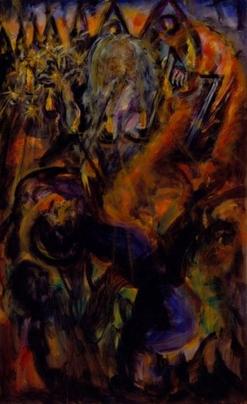
The Apocalypse Series encompasses 125 works consisting of 75 paintings and 50 drawings created between 1982 and 1984 by Nabil Kanso. The subjects of the works in the series are based on the Revelation of Saint John the Evangelist. The colors of this painting are somber, suggesting richness and heaviness, while the repetitive geometry of the shapes suggest apocalyptic inevitability. In Peran Erminy's article, The Apocalyptic Paintings of Nabil Kanso, he clearly states that Kanso's paintings portray our world today. He states that our world is constantly surrounded by violence and people feel vulnerable. The aggression one has can ultimately lead to a break out in war where the world will be doomed. Kanso's paintings reflect the path we are taking as a world. People today are quick to act upon threats leading us into a world that is ruled by war. This will be the hell on earth made by none other than human beings themselves. Kanso has a strong, intense effect on his audience's feelings and emotions. Kanso's work is dark and sometimes frightening, conveying how it is relevant to the scary obstacles of today's world. Our society seems to be stuck on depressing violence and aggression and if continued on this path, will only continue to result in tragic wars.

Vietnam is a mural-size painting made by Nabil Kanso in 1974 in response to the Vietnam War. It is done in oil on canvas measuring 3.65 by 7.30 meters.

Hiroshima Nagasaki One-Minute is the subject of two mural-scale paintings made by Nabil Kanso in 1978–79. One is titled 49-Second (Hiroshima) done in oil on canvas measuring 3 X 5.50 meters, the other 11-Seconds (Nagasaki) oil-on-canvas triptych measuring 3 X 4.60 meters center, and 2.75 X 1.32 meters each side.

Living Memory is the title of a series of 9 mural-size paintings on the Holocaust painted by Nabil Kanso in 1980, 1990 and 1993–94.

Time Suspended in Space is the title of a mural-size painting on apartheid in South Africa painted by Nabil Kanso in 1980. It is oil on canvas measuring 3.65 X 5.50 meters.
Kuwait is a group of approximately 40 paintings made by Nabil Kanso in 1990–91 on the Gulf War and Iraq’s invasion of Kuwait. The works in the series were first exhibited in Kuwait in March – April 1992 at the Free Atelier Art Center and traveled in June to Caracas for a special exhibit at the Palacio de Gobierno in honor of the Emir of Kuwait’s visit to Venezuela. Then, the exhibition proceeded to Geneva and was held at the Red Cross Museum in July – August 1992.

The Raven is a series of 28 watercolor paintings made by Nabil Kanso in 1995. The subjects of the works in the series are based on the 1845 poem "The Raven" by Edgar Allan Poe.
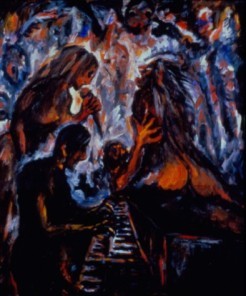
Jazz (Kanso series) is a series of 20 paintings made by Nabil Kanso in 1978–79. The subjects of the works are based on the jazz music and the entertainments night life in New York and New Orleans. The paintings are done in oil and acrylic on canvas measuring 224 X 182 cm (88 X 72 inches) each. Their compositions reflect predominant red tonality built with broad brushstrokes. Works from the series were exhibited in Atlanta in 1985.
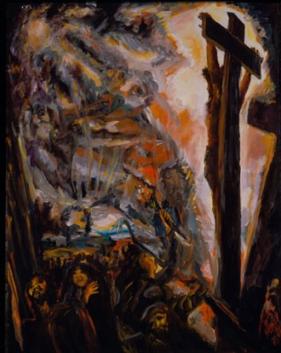
The Crucifixion is the subject of a painting by Nabil Kanso painted in 1983.

The Vortices of Wrath is a triptych painted by Nabil Kanso in 1977. It is part of the Lebanon series began in 1975 in response to the Lebanese Civil War. The triptych is done in oil on canvas measuring 3×7.60 meters. The center is 3×3 meters and each side 2.75×2.30 meters.
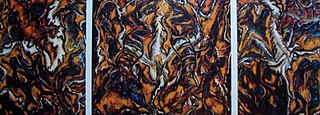
The Floating Shadows is a triptych made by Nabil Kanso in 1986 on the brutality and suffering inflicted during the Lebanese Civil War. The painting is oil on canvas and measures 2.75 x 7.60 meters. It forms part of the Cluster Paintings series that Kanso began in 1986 and marks the transition to a new approach in his compositional framework. The pictorial layout divides the canvas space into various sections reflecting a cluster of interlinked planes depicting floating figures of predominantly dark-blue set against deep orange ground and demarcated by white grayish areas.
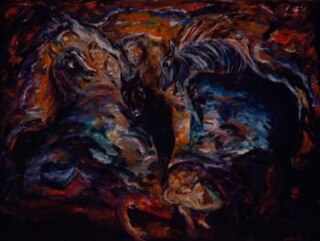
Apocalyptic Rider is a painting created by Nabil Kanso in 1980. It is oil on canvas measuring 7 X 9 feet, and is part of a series depicting horsemen in compositions dealing with apocalyptic themes.
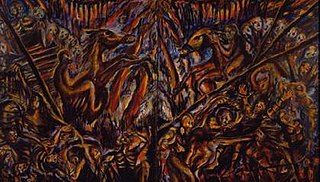
Apocalyptic Riders is a diptych executed in 1984 and is part of a series begun in 1980 by Nabil Kanso.

Endless Night is a painting executed in 1983 by Nabil Kanso in oil paint on canvas measuring 2.25 by 3 metres. It is part of a group of related paintings made by Kanso in response to the Lebanese Civil War. The painting depicts the ravages war in a scene that "embodies recurrent themes of carnage, suffering and the disintegration of humanity."

















